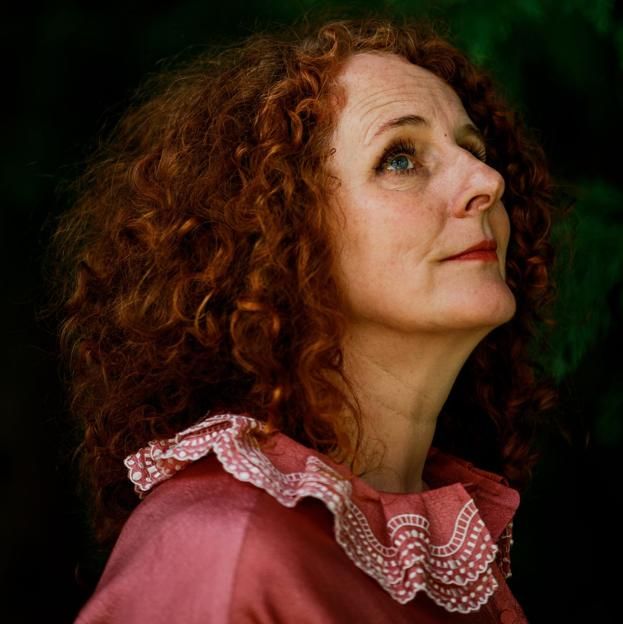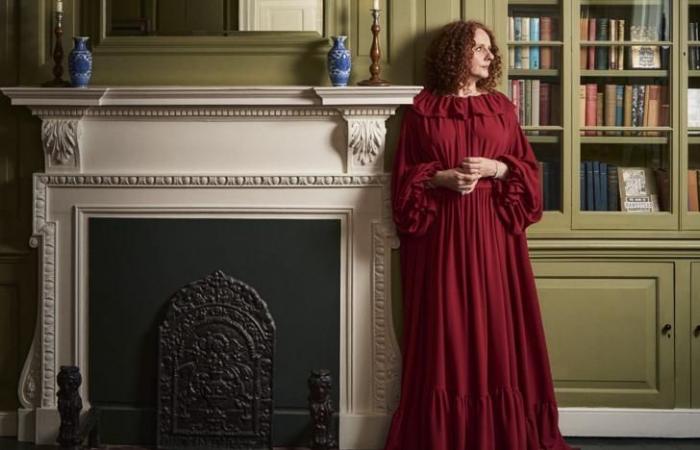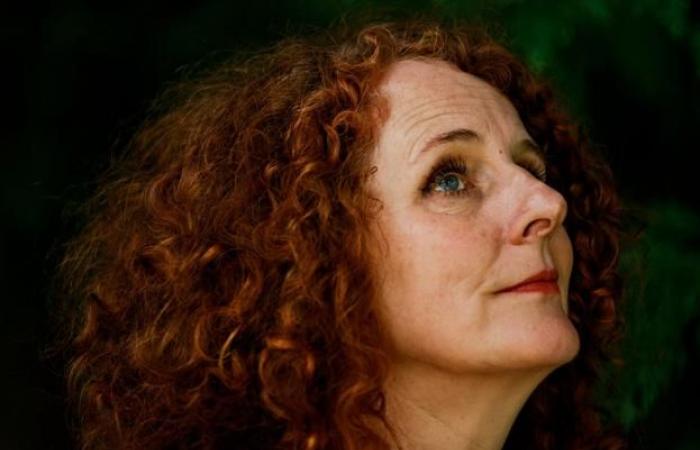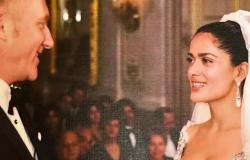Eight adolescents, four on each side, surround Maggie O’Farrell (Northern Ireland, 1972) on the stage of a ancient room of quinceañeros crowded. Each with a microphone and a list of questions in the hand. Sympathetic and expansive, it shows that the Irish author is in her sauce sharing curiosities about her creative process with the same high school students who have awarded the San Clemente prize for her novel The married portrait (2022). “Only for that, it is worth five times more than any other prize,” he confesses later in the beautiful office of the director of the Rosalía de Castro Institute of Santiago de Compostela, where he is spending a few days to collect the distinction and, incidentally, meet the city.
Immersy already in her next novel – “I will only say that she takes place in the Ireland of the nineteenth century” -, this will be an intense year for her. Although there is no trailer or release date, his most famous work, HamnetIt is called to become one of the films of the year. Directed by Chloé Zhao and starring Paul Mescalthe fictional story of William Shakespeare’s family is already a favorite in the oldest pools of the Oscar 2026. O’Farrell, however, he lives oblivious to noise. And absolutely disconnected from Hollywood. His head is in the fifth draft of his new novel, in the Deadline that stalks, in the busy domestic life and in the flowers of his garden.
Womanhoy. Teenagers are often spoken, in quite derogatory and paternalistic terms. Are we unfair to the youngest?
Yes, and it’s horrible. I tell my teenagers, I have one at home and very soon they will be two, which are great. They need to hear it! There is some culture that insists on telling them that they are cascarrabias and difficult. Imagine that they said the same as 30 or 40 year old people! Of course, they can be edges, but they are also hilarious, their brains are in full expansion and have incredible ideas about music, fashion or culture. They are starting to look at the world and move away. They need to grow and, in a way, get rid of you. And that’s fine.
They are accused, above all, of being attached to a screen all day …
Criticize them for that is not understanding anything. They have inherited a world created by our generation and a technology to which they are now addicted and in front of which they have no immunity. We remember the advantages of the analog world, but they do not know them and it is not their fault, but of those people so intelligent that they create the algorithms that hook them. What we have to do is protect them from the monetization of their brains. I find it terrifying. It’s like when, in the 70s, people smoked around babies. Now, we look at him with horror. Within 20 years we will think of this time in the same way.
And those he has at home, are you interested in what her mother, the great star of literature does?
They are all great readers, but they don’t read my books. And nothing happens, I prefer to be just his mother. When I was little, my eldest son used to take my books, he opened them on any page and read them high using a comic tone to make fun of me. Until one day, he took a book and began reading a sex scene. He didn’t do it again! It was very fun.
By the way, what kind of teenager was you?
A very bleak. I spent those years in a small coastal town and hated him. I wanted to live in the big city. I read a lot and, although my parents would have preferred a well -paid, safe and guaranteed retirement job, I just wanted to study literature. Then, I worked as a journalist and only wrote the weekends or at night. Until I had no child I didn’t leave the other jobs. Even then it seemed to me a precarious plan and I did not perceive myself as a writer. I only thought: “I’m going to take care of my baby while writing some books.” I think, in a way, I keep seeing it like that.
We live a convulsive political moment. What worries you most about what you see in the news or read in the newspapers lately?
I had to disconnect the radio from the alarm clock. Now, I get up with music. I read the newspapers, but I do not want to hear news at seven in the morning and notice how the tension uploads. It is all terrifying: the people who are in command, the wars … It’s very afraid and is difficult to metabolize.
In the midst of that landscape, what social function do you think the novel meets?
It is the way in which human beings return to our origins, to what differentiates us from the rest of the species: a language that allows us to communicate, form social groups and cling to our history. For me, literature has always been like a road map that allows us to see where we have been, where we go and what options we have now.
And what is it for you to be a writer?
A passion. I am super lucky to be able to make a living like that. I don’t understand the people who complain. I want to tell you: “Go make a night shift in the emergency room and tell me to be at home, in pajamas and talking to your imaginary friends is difficult.” Writing also allows you to learn many things. And I am very nerd. When I taught writing, I heard someone say that you should only write novels about what you know. For me, it is the other way around: he writes about what you don’t know why it is much more interesting.
The writer María Oruña He has said that there are authors who already use AI to create plots and that, on top of that, they boast of it. What do you think?
I have no desire to read a novel generated by artificial intelligence, but who knows? Maybe one day I do it … I do worry that IA is feeding on the work of the creators. In the United Kingdom, a copyright law is being promoted to avoid it. You can’t take the work of artists and give it to a machine. Anyway, I am not sure that AI can replace a human brain. It is not the same to generate what to create. Creation comes from a person’s brain, from his experience and imagination. Generating is different: it consists of processing and supplying.

The Irish Escritora Maggie O’Farrell. / Photo contact
Adapting your own novel is usually a delicate issue for a writer. How was the process of co -writing the Hamnet script?
It has been a wonderful experience. You have to enter it knowing that it cannot be an exact replica of the book. first, you have to distill it to its bones and turn all the emotions and thoughts of the book into dialogues. Then I attended how Chloé (Zhao) built it again in the filming with the actors, the costumes, the scenes, the looks … is fascinating.
As he said in his memoirs (I am here), he suffered encephalitis with eight years, he had to overcome severe stuttering and has lived 17 experiences close to death. How do you mark a biography like that?
My life takes place in my house with my children and my cats, and I have been married to the same man for 25 years. It’s not that I live the limit! But it is true that being aware of your own mortality since childhood marks you. You understand the fragility of life. That could have become a very cautious and prudent person, but it was just the other way around. I started thinking: “We are all so close to death that I will make sure to live in full.”
He has written very diverse books: from autobiographies to historical novels. Is there anything that connects them to all?
I don’t like to examine my work. It’s like looking directly in the sun: you can blind you. It is the same reason why I do not read the criticism: it is not that I am afraid of what they say, I do not want to have to explain myself. I don’t think it’s good to be so aware of your work. When you feel to write, you can start hearing those voices instead of your characters.
He said he goes for the fifth draft of his next novel. Does it hard for you to put the end point?
For me, finishing a book is almost like a mourning. It is very hard. I do not want to let it go because that moment in which we are only the book and I in my study is the part that I like the most. So, my husband, my editor or my agent tell me: «Enough. We take it ». There is always a paragraph or an adjective that does not convince you, but you have to say: “I have done everything I could and is close to whatever it was.”
Her husband, writer William Sutcliffe, is the first to read her manuscripts. And he says it is relentless. To the point of hurting your feelings?
No, because we are very accustomed. I don’t want to give my manuscript to someone to tell me it’s wonderful. It may be nice to listen to it, but it is useless. I trust his opinion a lot when he tells me: “This part works, this is a garbage, in this one you are not understood what you are telling …” I think it is worse for him: “Let’s see what I find and how I tell you!” [Risas].
The dark side of selling so much are expectations. Note that pressure?
It is good for me to isolate myself. I neither read criticism nor in social networks. I am fortunate to pretend that the outside world does not exist. If you are thinking about what readers or your editor would like, it is difficult to write a good book. I have never done it like that and I don’t think I could. The answer, in my case, is always inside. It has to be the type of story that burns, that explodes, within you. That is always the right book. The idea of writing with an imaginary reader looking over your shoulder seems terrible to me.
He does not like to talk about his creative process. Is it important to preserve the mystery?
I have no routines or rituals. I know that there are writers who plan everything in a meticulous way, but for me it is just the opposite: I plan on the march. It baffles me when someone explains that he goes to run in the morning, then sits to write and when he has a thousand words for until the next day. For me, each book is different and requires different methods. My only ritual is to disconnect the Internet: I do not attend the email or the apps and I do not answer the phone. I have to be incommunicado. Then, in all the books there is a brick wall and it is no use to stay there throwing you from your hair. At that time, it helps me go out. By the time you return, it will probably have been resolved alone.
Beyond writing, what gives you more satisfaction at this time?
I love swimming, cooking, I have a garden in which planting flowers and aromatic herbs, although I have not yet managed to reap vegetables. But the best are my children. For me, they are the most interesting human beings who have stepped on the face of the earth. To have seen how they learned to walk, read or write and how they lived that wonderful stage in which they believed in magic and put a rock on the radiator convinced that a dragon will come out from there is incredible. Observing how the history of your life develops is fascinating.
Does a novelist have to think that his best book is yet to continue writing?
You have to feel that there is something pending. If I thought one of my books is perfect, I would stop writing. It is the feeling of dissatisfaction that makes you continue. Also, with all the books you learn something. I would never want to get to the point of thinking: «That is, I have achieved it. It is my best work ».








